- Home
- C. L. Moore
Judgment Night Page 5
Judgment Night Read online
Page 5
“The weapon—” he called above the crashing. “No chance for us…came too fast—We’ve smuggled out one man…fast ship…bringing a model to you. Watch for him. They’ll follow—” A blazing beam came down between his face and the screen. Through a thin curtain of fire he mouthed at them some last urgent message of which only a word or two came through. “Weapon…might save the Galaxy…give them a blast for Dunnar—” And then the fire blazed up to blot out face and voice alike, and Dunnar’s ruined image faded from the screen.
For a moment after it was gone, the warm firelight flickering through the room seemed horrible, a parody of the flames that had engulfed the spokesman in the panel. The crash of burning Dunnar still echoed through the quiet, and the hoarse, despairing voice of the last man. Then the emperor said in a flattened tone:
“I wanted you all to hear it a second time, before we go out to meet the ship.”
Juille uncrossed her long bare legs and leaned forward, scowling under the crown of dark-gold braids.
“We’re ready for them,” she said grimly. “That weapon wasn’t quite finished, though.”
“That’s why they struck when they did,” murmured an amazon officer beside her. “Beautiful timing—beautiful! Almost a split-second attack, between the finish of the weapon and the mounting of it.”
There was silence in the room. The opening blow had been struck of a battle that must engulf every world in the Galaxy before it ended. No one spoke for a while, but the air was heavy with unvoiced thoughts and most of them were grim.
The emperor put out a hand to the game set up on a table before him and moved a bead along a curve of colored wire. It was a game of interplanetary warfare, played like chess, though the men moved both vertically and horizontally on wires like an abacus. Firelight glinted on the colored beads carved like ships and worlds.
“You’ll lose your master planet unless you bring up the blues,” Juille told him absently.
“This is a solitaire game,” said the emperor. “Mind your own business.”
The rain blew pattering against the glass and the fire crackled softly. Juille’s llar came out from beneath her chair, stretching elaborately, yawning to show a curved pink tongue. The crackling of the logs was a whisper of the terrible roaring crackle they had heard across the void from Dunnar’s collapsing cities. They would hear it again from other worlds before the holocaust ended that had begun almost before their eyes here. Perhaps they might listen to it in this very room, on the sacred soil of Ericon itself. Other dynasties had crumbled upon Ericon before theirs.
“Why don’t they report again on that ship?” the emperor said irritably, flipping a carved bead around a curve with too much force, Juille, seeing its course, automatically opened her mouth to object, and closed it again without saying anything. The llar swung itself up on the emperor’s table with soundless ease and put out its webby-fingered paw to move two beads precisely along the notched wire.
“Ah, so you know Thori’s Gambit, little friend?” The emperor’s tired face creased in a smile as the llar’s round-eyed stare met his through the maze of painted wires. He moved a translucent red bead between the two the llar had shifted. “I wish I could be sure that was an accident. How much does a llar really know?”
The little animal put its head down, rolled up its strange, shining eyes and wriggled all over, like a playful kitten. But when the emperor stretched out a hand to stroke it, the llar turned deftly away and flowed down over the table edge onto the floor with a grace that was almost frightening in its boneless ease.
The screen glowed above the fireplace. Everyone looked up, even the llar. An expressionless face announced in expressionless tones:
“Escaping Dunnar ship approaching landing field from space. Three enemy pursuit ships have succeeded in passing the Ericon space guard and still survive.”
The emperor got up stiffly. “Come along,” he said. “We’ll watch.”
They came out in a window-walled room above the landing field. A fine mist blew in through the openings, sweet with the fragrance of the wet green hills beyond. The clean smell of wet concrete rose from the broad, brown expanse below, where the small figures of attendants dashed about excitedly in preparation for the landing.
One inner wall of the room was a screen upon which they could all see now what had been taking place overhead, above the layers of rain cloud. The emperor sat down without taking his eyes from the screen. Juille crossed her arms on the high back of his chair and watched, too, ringing one spur in a half-unconscious, continuing jingle. Everyone else was silent, standing respectfully back, and the sound of breathing was loud in the quiet.
On the screen they could see how the tiny black ship from Dunnar had cut its rockets and hurled itself headlong into the gravitational embrace of Ericon, swinging around the planet to subdue the speed it had not dared slacken in space. Behind it, still in suicidal pursuit, the three H’vani ships flamed on. They had escaped the space guard only because of their smallness and mobility, which meant that the range of their weapons was too limited to do much damage at a distance. But they were cutting down the space between them and their quarry, and the race was close.
“They’ll have to turn back now,” breathed Juille, gripping the chair-back. “They won’t dare…look, there go our interceptors.”
The screen divided itself in half with an oddly amoebalike motion, one section showing the swift rise of Ericon’s interceptors while the other mirrored the orbit of the newcomer as it swung around the Control Planet still at dangerous speed. It was curious to think of the plunge into circumscribed space-time which that ship was just now making as it emerged from deep space where neither time nor distance have real meaning. The fugitive had flashed through morning and noon and night, and come around the world into dawn again, and so into the misty forenoon above the watchers.
Now they saw it put out wings upon the thin upper air, like a diver suddenly stretching out his arms, and come coasting down upon their sustaining surfaces in a great sweeping spiral above the field.
“There goes one of ’em,” the emperor said in a satisfied voice. Juille glanced back at the upper screen and saw one of the pursuers from space twisting downward, its black sides beginning to glow already from the friction of that thin high air. It dropped incandescently out of the picture, which was following the other two ships in their headlong flight. Their own sheer speed gave them an advantage. They were drawing away from the interceptors, taking full and suicidal advantage of the fact that upon Ericon immutable law forbids any aircraft to fly at will over the surface of the sacred planet.
“They won’t dare—” Juille told herself under her breath, leaning forward. Behind her a rustle and an indrawn breath all through the room spoke the same thought. For the enemy ships, winged now and swinging down through the heavier air in pursuit of their escaping prey, were being driven farther and farther off the prescribed course beyond which all air traffic is forbidden.
The interceptor ships were sheering away. Juille could picture the frantic indecision of their commanders, torn between the necessity to destroy the invaders and the still more urgent necessity not to transgress an immemorial law laid down by powers even higher than the Galactic emperor’s.
In the lower half of the screen, the single-winged ship had leveled off for a landing. Someone outside shouted, and for a moment all eyes turned to the windows and the broad concrete field outside.
Down out of the misty clouds came a duplicate of the shape upon the screen. In silence, the black-winged ship came swooping through the rain, lower and lower over the heads of running attendants. It hovered to a halt and sank down gently upon its own reflection in the wet concrete. And upon the screen behind them, the same scene took place in faithful duplicate.
Indeed, the image was more faithful than the reality, for at this distance the naked eye could see only a swarming of tiny figures around the newly arrived ship. The emperor called, “Closer,” and turned back to the screen.
/>
The scene below rushed into a close-up upon the wall, swooping toward them with dizzy speed. Now they could watch the opening slide into view upon the ship’s side, and the man who ducked out and stepped down upon the brown concrete in the drizzle of misting rain. It beaded his shoulders with moisture in the first few moments. He blinked the rain out of his eyes and looked about calmly, not in the least hurried or alarmed.
The envoy from Dunnar was an astonishing figure, so tall and so very thin that at first glance he looked like a scarecrow shape beside his vessel. But when he turned to face the crowding attendants and the screen, he moved with a grace and sureness that had something unmistakably regal about it. He wore his plain black overall with a remarkable sort of elegance, and his own quiet sureness seemed to throw everyone else on the field out of focus. The muscular attendants looked squat and brutish by contrast with his scarecrow height; the well-dressed officials moving forward to receive him were vulgar beside his overalled simplicity.
He looked up into the featureless clouds where his pursuers and his defenders still waged an invisible battle. All around him the crowding men looked up, too, futilely. Only in the control room, where the emperor and his staff sat, did the eyes that followed that lifted gaze see what was happening overhead.
And now, as their gaze went back to the neglected drama above, a horrified fascination seized upon every watcher in the room. Even Juille’s unconsciously jingling spur was silent. She felt the sudden clutch of small fingery paws, but she did not glance down as the llar came swarming up her leg to a vantage point upon her shoulder. She felt its tiny, quick breathing against her cheek as it, too, stared.
Not within the memory of any living man had the law of the Ancients been violated which forbade air traffic over Ericon. Obedience to those laws had been rooted as deeply as obedience to the law of gravity. There were violations, of course; tradition said all such violators died instantly.
Juille watched the first such episode in modern times with a catch in her breath and her throat closed from tremendous excitement. She wondered if everyone else in the room felt the same half-guilty anticipation, the impious wonder.
For there was a wide gap now between the enemy ships and the Ericon interceptors. It had been a suicide pursuit anyhow, for the H’vani. They were certainly doomed. And they were taking one last headlong chance in the hope of destroying their quarry before they were themselves destroyed. The interceptors had forced them by now far out of the narrow traffic lane whose invisible boundaries should have been so rigid. For the first time in living memory, ships spread their wings upon the forbidden air of Ericon.
They were swooping down in a long dive now, coming fast through the clouds toward the landing field where the newcomer stood unconcernedly staring up into the mists that hid them.
“They’re going to make it—they are!” Juille whispered to herself, gripping the chair-back with aching fingers.
Out of the landing field, crews were manning the antiaircraft guns in frantic haste, sheer incredulity numbing their fingers as they worked. No one had ever quite believed that these guns could be needed. They were meant for defense against ships attacking from directly overhead, in the prescribed landing lane from space. Even that possibility had seemed absurd. But now—
“Get that fool off the field!” the emperor roared suddenly, making everyone jump. “Get him off! They’ll be here in a minute. Look at them come!”
Down through the mist the two surviving ships came driving through air that shrieked away from their wings. Men were scattering wildly from the field. Loudspeakers roared at the Dunnarian to take shelter. He stood imperturbably, tall and thin and quiet, looking up into the clouds.
And for a timeless moment a faith rooted millenniums deep in human minds shook terribly as the Ancients were defied—and stayed their hand. No peril to the defenseless envoy on the field—though he carried a secret that might save their race—moved the watchers half so deeply as what they were seeing now. The ships dived on through the screaming air, and behind them clouds boiled furiously in the vortex of their passage.
Did the Ancients really exist at all? Or had all those legends been legends only? The breath of every watcher paused in his throat as he waited the answer.
But no one saw the vengeance the Ancients took. All over the planet shaken watchers followed the action upon their screens—but no human eye saw the blow fall.
One moment, the black ships were screaming down through grayness; the next instant, without warning, there came a soundless flash like the flash of sunlight glancing from some colossal mirror, blinding every eye that watched.
There was no sound. The riven air screamed itself quiet. When those who stared could see again out of dazzled eyes, nothing remained but the vortex of clouds split by the plunging ships. And even the vortex was quieting now. Of the ships, nothing remained. For the first time in living memory, the Ancients had struck, invisibly, before a world of watchers, in the deadly dignity of silence.
And all over Ericon, a world-wide sigh of relief went up wordlessly.
In the utter quiet, the envoy moved forward at last across the wet concrete. Overhead, that vast boiling of clouds had cleared a space for the rare blue sky to shine. The reflecting pavement turned suddenly blue and glorious as he stalked across it with his long scarecrow stride. Awed eyes watched him come, a black figure moving with strange, smooth elegance over the blinding blueness of the sky’s reflection.
“Stop that jingling and come along, Juille,” the emperor said at last in the silence, rising as stiffly as he had sat down. “We’ll see him in my library, alone. Wake up, girl! Come along.”
“—And the weapon?” said the emperor eagerly, leaning forward between the arms of a great carved chair before his library fire.
No one could have guessed from the look of the man before him that he had come straight from a desperate flight and an awesome rescue, or that he carried a cargo so precious a whole Galaxy’s fate might depend on it. He was the last Dunnarian left to speak for his ruined world, but no emotion at all showed upon his cool, impassive face.
“I’ll want my men to look over the weapon at once,” the emperor went on. “It’s in your ship?”
“Highness, I brought no weapon.”
“No weapon!”
Juille watched a familiar thunderous look gather upon her father’s face, but the storm did not quite break and Juille smiled to herself, understanding why. It was difficult to treat this man like an ordinary person. His appearance was extraordinary enough, without that recollection of an hour ago which had struck a whole world into reverent silence.
This was the man who had stood unafraid beneath the plunge of the enemy ships, unprotected, so confident in the power of the Ancients that he had not wavered even when death seemed certain. This was the man above whom the Ancients had for the first time in living memory put out their hands and wrought a miracle. He had, of course, been only the occasion, certainly not the cause. But he was haloed still in the reflected glory of that moment which was already taking its place in legend.
“I have no weapon,” he said again, meeting the emperor’s glare with an imperturbable gaze from his great, luminous eyes that never winked. “We dared not risk letting a model fall into H’vani hands, highness. I will have to make one for you.”
Juille saw her father settle back, mollified, perhaps a bit relieved that he need not thunder at this remarkable and disconcerting man. Perhaps it had occurred to the emperor, as it had to Juille, that immortality which might outlast their own had already descended upon the envoy’s smooth, narrow-skulled head. Unborn generations would repeat in awe the story of his experience today.
She stared frankly at the man, wondering very much from what ancient line he sprang and what knowledge lay behind the strange, thin face with its falcon nose and its large, transparent gray eyes and the mouth that looked at once cruel and oversensitive. Seen this near, he seemed even taller and thinner and more oddly scarecrowlike
than on the screen, yet the extraordinary fastidious precision of his motion made every other man alive seem crude and clumsy. He had an ageless face, and a poise that seemed bred into the very genes of his ancestors. Juille had a glancing, vivid recollection of Cyrille—for a moment she was drifting on a cloud again, and a young man cloaked in flowing yellow curls bending above her—and she thought wryly how much he would have envied this Dunnarian’s unstudied elegance. Even the stained overall, thus worn, looked like some fashion a Galactic prince had just set for the capitals of the worlds to copy.
“You’ll have to get to work immediately,” the emperor’s voice recalled her to the urgent present. “We must have a model of the weapon at once. Too bad the H’vani timed their attack so well. In a few days more you might have fought them off with it, eh?”
The Dunnarian shook his narrow, bird-shaped head gravely.
“Our men never succeeded in expanding the scope of the weapon that much, highness. It remains a weapon for the individual, against the individual, but within that scope I believe it’s the most effective thing ever made.”
“A delayed-action killing, isn’t it?” Juille said.
The luminous eyes turned to her. There was an infinite quietness in their stare, curiously at odds with the man’s words.
“It is, highness. That gives it a strong psychological threat value, as well as a physical one. With every other comparable weapon, its operator has to sight and fire while the enemy is exposed to view. With the new one, a man may be killed not only at any distance, but at any time, once its sight has been fixed upon him. A quasi-photograph of the victim’s brain pattern is snapped, and he is doomed from that moment, though you may not choose to pull the trigger for many days. Then, irrevocably, the weapon remains focused upon him, figuratively speaking, until it is discharged. He will be unable to travel far enough to escape it, and no hiding place can save him.”

 The Complete Jirel of Joiry
The Complete Jirel of Joiry Quest of the Starstone
Quest of the Starstone The Tree of Life
The Tree of Life Judgment Night
Judgment Night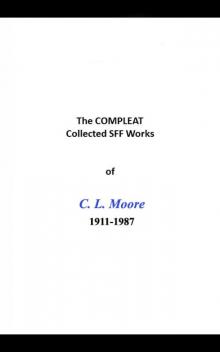 The COMPLEAT Collected SFF Works 1911-1987
The COMPLEAT Collected SFF Works 1911-1987 Northwest of Earth
Northwest of Earth No Boundaries
No Boundaries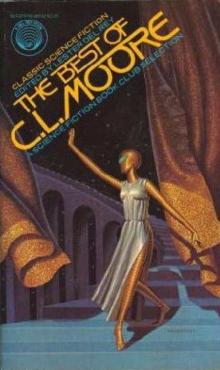 The Best of C. L. Moore
The Best of C. L. Moore Doomsday Morning M
Doomsday Morning M Shambleau and Others M
Shambleau and Others M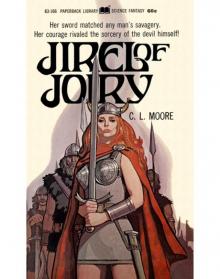 Jirel of Joiry
Jirel of Joiry Judgment Night M
Judgment Night M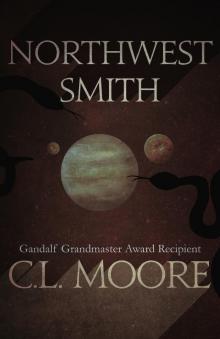 Northwest Smith
Northwest Smith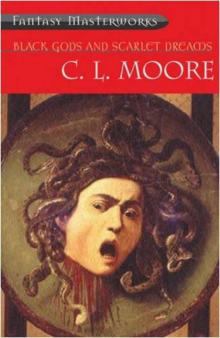 Black Gods and Scarlet Dreams
Black Gods and Scarlet Dreams